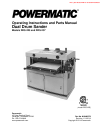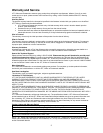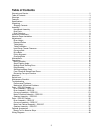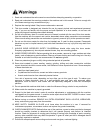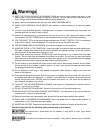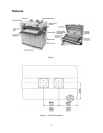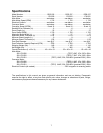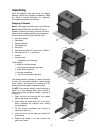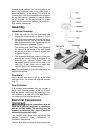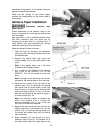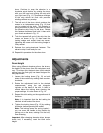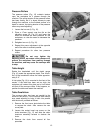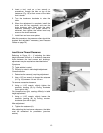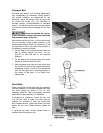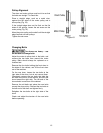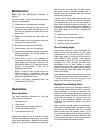
5
18. KEEP THE FLOOR AROUND THE MACHINE CLEAN and free of scrap material, saw dust, oil and
other liquids to minimize the danger of tripping or slipping. Be sure the conveyor table is free of all
scrap, foreign material and tools before starting sanding operations.
19. Keep visitors a safe distance from the work area. KEEP CHILDREN AWAY.
20. MAKE YOUR WORKSHIP CHILD PROOF with padlocks, master switches or by removing safety
keys.
21. Give your work undivided attention. Looking around, carrying on a conversation and “horse-play” are
careless acts that can result in serious injury.
22. Maintain a balanced stance at all times so that you do not fall or lean against the blade or other
moving parts. DO NOT OVERREACH or use excessive force to perform any machine operation.
23. USE THE RIGHT TOOL at the correct speed and feed rate. DO NOT FORCE A TOOL or attachment
to do a job for which it was not designed. The right tool will do the job better and safer.
24. USE RECOMMENDED ACCESSORIES; improper accessories may be hazardous.
25. MAINTAIN TOOLS IN TOP CONDITION. Keep tools sharp and clean for safe and best performance.
Dull tools increase noise levels and can cause kickbacks and glazed surfaces. Check the condition
and adjustment of the tools before making any cuts.
26. Keep hands outside the machine. NEVER reach under the guards to try to clear stock that stops
feeding. Do not clear chips and sawdust with hands; use a brush. Do not have any part of the hands
under that part of the board that is over the table when starting a cut; the pressure roller will engage
the board and force it down against the table causing a pinching action.
27. Do not attempt to sand boards with loose knots or with nails or other foreign material, on its surface.
Do not attempt to sand twisted, warped, bowed or “in wind” stock unless one edge has been jointed
for guiding purposes prior to sanding.
28. Do not attempt to sand long or wide boards unsupported where spring or weight could cause the
board to shift position.
29. If the operator leaves the machine area for any reason, the sander should be turned "off" and come to
a complete stop before his departure. In addition, if the operation is complete, he should clean the
sander and the work area. NEVER clean the machine with power "on" and never use the hands to
clear sawdust and debris; use a brush.
30. TURN OFF THE MACHINE BEFORE CLEANING. Use a brush or compressed air to remove chips or
debris — do not use your hands.
31. DO NOT STAND ON THE MACHINE. Serious injury could occur if the machine tips over.
32. NEVER LEAVE THE MACHINE RUNNING UNATTENDED. Turn the power off and do not leave the
machine until it comes to a complete stop.
33. Remove loose items and unnecessary work pieces from the area before starting the machine.
34. DON’T USE IN DANGEROUS ENVIRONMENT. Don’t use power tools in damp or wet locations, or
expose them to rain. Keep work area well lighted.
35. DIRECTION OF FEED. Feed work into the drum against the direction of rotation of the drum only.
Familiarize yourself with the following safety notices used in this manual:
This means that if precautions are not heeded, it may result in minor injury and/or
possible machine damage.
This means that if precautions are not heeded, it may result in serious injury or possibly
even death.



